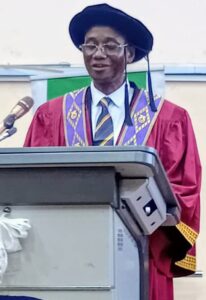

By Correspondent in Ilorin.

A Professor of Chemical Engineering at the University of Ilorin, Professor Rafiu Olasunkanmi Yusuf, has called on the Nigerian government and private sector to invest in innovative waste-to-energy technologies and enforce environmental regulations to tackle the country’s mounting waste and emissions crisis.
Delivering the university’s 286th inaugural lecture, titled “Waste Stream and Emissions Management for Sustainable Development”, Professor Yusuf identified funding constraints and technological limitations as major barriers to sustainable environmental management in Nigeria.
“One of the most significant challenges is funding. Government and the private sector must invest in large-scale research and pilot projects to drive sustainable solutions in waste and emissions management,” he said.
Professor Yusuf noted that Nigeria’s environmental engineering efforts are hampered by inconsistent enforcement of existing regulations and outdated policies.
“There is a serious regulatory gap. Enforcement is weak, and our policies often lag behind technological advancements. This undermines responsible waste management in both the industrial and energy sectors,” he stated.
He advocated for the adoption of emerging technologies—such as anaerobic digestion, gasification, and pyrolysis—to convert waste into renewable energy. These technologies, he said, would help manage waste sustainably while contributing to the country’s energy mix.
Professor Yusuf, who holds degrees from universities in Lagos, Sokoto, Ife, and Johor (Malaysia), stressed the need to transition towards a circular economy that emphasizes resource recovery, waste minimization, and closed-loop systems.
“This shift towards a circular economy offers exciting prospects for developing nations like ours,” he said.
He also underscored the role of big data and machine learning in environmental monitoring, noting that predictive models can improve recycling systems and reduce emissions.
“By integrating data analytics into environmental systems, we can forecast waste generation and optimise operations for better efficiency,” he explained.
On climate change, Professor Yusuf highlighted the need for technologies that reduce greenhouse gases, particularly methane. He said his research on methane and non-methane gaseous pollutants aims to support this goal.
In a heartfelt appeal, the professor urged the Kwara State Government to revive the Integrated Solid Waste Management Facility project for Ilorin, originally proposed for Gbagede and designed by CIWAT Engineers.
“The factors that justified Gbagede as the project site remain valid, except that Ilorin’s population—and its waste volume—has increased. Revisiting this project is vital to curbing indiscriminate dumping across the city,” he said.
He concluded with a call for stronger collaboration among policymakers, industry leaders, and academic researchers to advance Nigeria’s environmental sustainability goals.
The event was attended by the Vice-Chancellor, Deputy Vice-Chancellors, Registrar, Bursar, University Librarian, Deans, professors, students, and guests from across the country.
Edited by Dada Ahmed.


